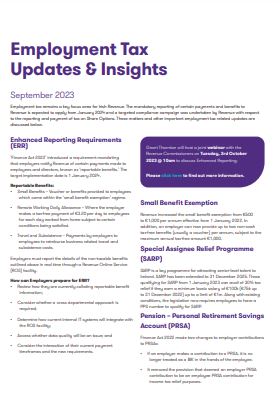
Enhanced Reporting Requirements (ERR)
Finance Act 2022 introduced a requirement mandating that employers notify Revenue of certain payments made to employees and directors, known as ‘reportable benefits’. The target implementation date is 1 January 2024.
Reportable Benefits:
- Small Benefits;
- Remote Working Daily Allowance; and
- Travel and Subsistence.
Employers must report the details of the non-taxable benefits outlined above in real time through a Revenue Online Service (ROS) facility.
How Can Employers Prepare for ERR?
- Review how they are currently collating reportable benefit information;
- Consider whether a cross departmental approach is required;
- Determine how current internal IT systems will integrate with the ROS facility;
- Assess whether data quality will be an issue; and
- Consider the interaction of their current payment timeframes and the new requirements.
See here for further guidance on ERR
Small Benefit Exemption
Revenue increased the small benefit exemption from €500 to €1,000 per annum effective from 1 January 2022. In addition, an employer can now provide up to two non-cash tax-free benefits (usually a voucher) per annum, subject to the maximum annual tax-free amount of €1,000.
Special Assignee Relief Programme (SARP)
SARP is a key programme for attracting senior-level talent to Ireland. SARP has been extended to 31 December 2025. Those qualifying for SARP from 1 January 2023 can avail of 30% tax relief if they earn a minimum basic salary of €100k (€75k up to 31 December 2022) up to a limit of €1m. Along with existing conditions, the legislation now requires employees to have a PPS number to qualify for SARP.
See here for further guidance on SARP.
Pension - Personal Retirement Savings Account (PRSA)
Finance Act 2022 made two changes to employer contributions to PRSAs:
- If an employer makes a contribution to a PRSA, it is no longer treated as a BIK in the hands of the employee.
- It removed the provision that deemed an employer PRSA contribution to be an employee PRSA contribution for income tax relief purposes.
Shares Options – Revenue’s Compliance Focus
During 2022, Revenue identified discrepancies following an analysis of employer annual share reporting forms (e.g. Form RSS1) against available data (e.g. personal tax returns). Revenue is now undertaking targeted compliance activity in this area.
An employee's compliance obligation with respect to Share Options include:
- Register for Relevant Tax on Share Options (RTSO) with Revenue;
- Pay RTSO within 30 days of exercising options;
- Complete a RTSO1 Form when making the relevant tax payment;
- By 31 of October the following year (or mid-November if filing and paying online), complete a Form 11 personal tax return for the year in which the option is exercised, assigned and/or released;
- On sale, report the details to Revenue via a Form 11 or Form CG1 even if no tax is due;
- Pay Capital Gains Tax (CGT) where a chargeable gain arises on the disposal of shares; and
- Declare any attaching dividend payments and ensure appropriate taxes are remitted to Revenue.
See here for further guidance on share options.
PAYE Revenue Audits
Revenue have recommenced its PAYE audits following a pause during the pandemic period. Revenue encourages employers to undertake a self-review and correct any matters they encounter. Handling matters in a timely manner allows employers to avail of self-corrections without penalties and correct current year adjustments via payroll.
Common PAYE audit focus areas include:
- BIK on company vehicles;
- Provision of vouchers/benefits to employees;
- Application of PAYE on share awards;
- Payment of tax free mileage and subsistence rates; and
- Use of contractors who may be considered de facto employees.
PAYE Settlement Agreements (PSA)
Where benefits provided by employers are ‘minor and irregular’, the employer may avail of a PSA to remit the taxes arising on such benefits to Revenue. Revenue requires a written application by 31 December in the relevant PAYE year e.g. 31 December 2023 for the PAYE year,1 January to 31 December 2023.
How Can Grant Thornton Help?
At Grant Thornton, our specialist Employer Solutions team have extensive experience in employment tax matters. Contact us today to discuss your employment tax requirements.



